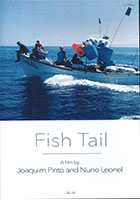
Fish Tail (Rabo de Peixe) 2015
Distributed by Grasshopper Films, 12 East 32nd St., 4th Floor, New York, NY 10016
Produced by Joaquim Pinto and Nuno Leonel
Directed by Joaquim Pinto and Nuno Leonel
DVD, color, 103 min.
High School - General Adult
Anthropology, Fisheries, Geography, Azores
Date Entered: 12/20/2016
Reviewed by Cliff Glaviano, formerly with Bowling Green State University Libraries, Bowling Green, OHFilmmakers Pinto and Leonel came to Rabo de Peixe (literally Fish Tail in English), São Miguel, Azores to welcome in New Year 1999 and decided to make a film about the artisanal fishery based there. They were invited to sail with Artur to film night fishing for mackerel, and later with Artur’s son-in-law Pedro, filming daylight crab trap retrieval and later, long-line fishing for swordfish. The artisanal fishery is characterized by the use of small boats from 21 to 30 feet long, crewed by from 4 to 16 fishermen, and limited to a fishing ground that extends only 20 miles from shore. Through the year of filming, the viewers are introduced to the fishing crewmembers, their families and their lifestyle, which is increasingly threatened by large-scale commercial trawler fishing. The film is in Portuguese with excellent English subtitles.
Unlike local farms which are controlled by big owners in the Azores or in continental Europe, the fisheries are controlled by the fishermen. The freedom of the fishing lifestyle is much preferred over farming for absentee owners. Fishing crews share equally in the profit of a successful fishing trip, but also share the disappointment of a poor catch. Whether the voyage is successful or not, crewmembers are expected to complete the day’s fishing activities down to fish cleaning and preparation for shipping, plus equipment repair and storage. The fishing is hard, dangerous work that involves much preparation off-water, and intricate teamwork on the water for a chance at a successful catch. Small-boat fishing is strictly regulated by the maritime authorities. Catches, licenses and equipment are regularly inspected.
This film is an intimate look at the male side of the small-boat fishing trade in the Azores. Since the focus is on the fishermen, their spouses, female friends and children are seen only peripherally, at communal meals, celebrations, church and the blessing of new boats. The filming and sound work at sea is extraordinary. The viewer is placed within inches of fast-paced line setting involving baited stainless steel hooks and deftly coiled monofilament lines, as well as the trading off of roles during the hand-over-hand retrieval of swordfish, some weighing in excess of 200 pounds. Nothing, at sea or on land, seems to have been withheld from the camera by the crew members.
Fish Tail is highly recommended as an exposure to a traditional lifestyle that is rapidly disappearing. None of these fishermen will ever become rich. Success, and there is a lot of success, is measured by the time spent working and fishing together. The catch, their further success, is shared freely among the crew, their families and their community. It is amazing that such a simple, straightforward means of making a living can exist within a very few miles of the extensive tourist and vacation industry on the rest of Isla São Miguel.